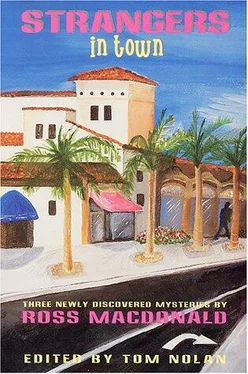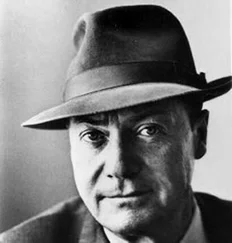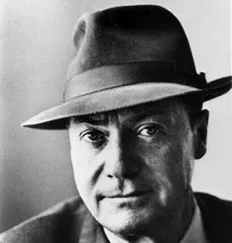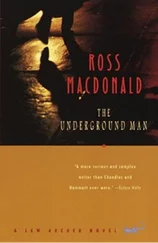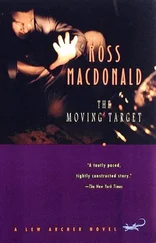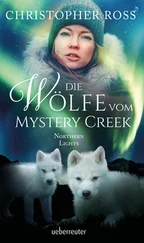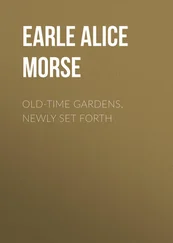Margaret pronounced herself thrilled with the Rogers stories: "Was utterly delighted at your dialogue & the freer flow of things. There's nothing amateur in them." She wrote a final paragraph for "Water" as instructed, made the inserts he'd requested, had the stories professionally typed and sent them to New York for submission.
Margaret too was working on a story for the contest; hearing it described, her husband said, "It sounds like the sort of thing that could cop a prize by originality and good writing…"
Stimulated by his Rogers efforts, Millar found he now had "plenty of good ideas for shorts — too many — but would hate to spend too much time unprofitably." Still he took time to write a third competition entry — not "The Tribulations of Mr. Small" but a grim murder story titled "Shock" (told completely in dialogue, and finished in four hours) which he mailed from the south Pacific directly to Ellery Queen.
With his EQMM "duties" out of the way, Millar returned to his novel. He was able to brag to Margaret in mid-November: "I am proud to report that I've added, in the last four days, 8000 words to Ride — not all of it good, by any means, but all of it wordage, and some of it good, in varying ways… Ain't it hard, though, to handle a bunch of people on a train trip?… I've fluffed it quite badly but I don't give a damn… [W]hat I want is to finish this book, my personal albatross, and never think of it again."
As he wrote, the Shipley Bay made its way to the atoll of Kwajalein and back. In addition to writing, as usual Millar read: Don Marquis' Archy and Mehitabel, Ann Arbor friend Henry Branson's latest mystery The Fearful Passage ("quietly perfect… damn good"); and Prater Violet, a brief novel about a film producer, by one of Maggie's Warners co-workers, Chris Isherwood. "As a piece of technical work," Millar said of the latter, "the book can teach me plenty: it has an easy grace and deceptive casualness that I find very enviable." But not as enviable as the traits of his latest literary hero: "A page of the letters Fitzgerald dashed off almost invariably has more meat than one of Isherwood's very carefully written pages," Millar maintained. "Compared with Fitzgerald, Isherwood doesn't seem very much alive." He went back to re-reading Margaret's gift copy to him of Fitzgerald's The Crack-Up .
Millar the writer continued to make good progress on The Long Ride . When he learned late in December he'd be discharged from the service next March 15, he wondered if that might not give him just "time enough… to run another book through the mill."
Meanwhile the current one needed last-minute research. Two days before Christmas, Millar finally managed to reach a Honolulu detective by telephone from the Navy Yard to verify Hawaiian police procedure and terminology for his book's early scenes. The Suicides (his new title for The Long Ride ) was ready to be typed. A shipmate prepared the manuscript for Millar, so sick of typewriters after his Shipley Bay duty he wouldn't touch one for the rest of his life. The author fed Suicides to his buddy one chapter at a time, "so the suspense will be an incentive to go on typing in the heat."
"Having written hard and daily" for two months, Millar gave himself the holiday "to see what pops up in my mind to write next." He wanted to turn "Death by Water" into a book but couldn't make plans until hearing whether Ellery Queen had bought the short story ("doubtful, but a possibility"). One non-detective novel he considered writing was a "rustic story" based on an Ontario family whose farm he'd worked on before college: "You may sneer," he wrote Maggie, "but if I could do it right it'd be a best-seller."
While mulling his next literary move, Millar "buried" himself "(shallowly) in inconsequential reading," including the non-fiction Viking Murder Book anthology; and viewed "some of the more unlovely examples of American movie making," including Fog Island — "in which one guy is followed by another guy who is followed by another guy who is followed by another guy. You think I'm exaggerating? You're an optimist." Other shipboard movies in December included Fired Wife ("continuously embarrassing"), She Gets Her Man ("just moderately terrible"), Boom Town, White Cargo, and Iceland , with Sonja Henie doing the hula (" really embarrassing"). Of the Shipley Bay cinema, Millar cracked: "You pays no money and you gets no choice."
He also read a text Maggie had given him on how to write "Fast Detective stories" for Clayton Rawson, an editor at True Detective and Master Detective magazines, which he thought (as she did) good: "while it didn't encourage me to write Fast (D.) stories — I prefer fiction what is fiction — I… was stimulated to sit right down and do a complete outline for another spy book… a 24-hour job, fast and mysterious with romance in it even." "The Box" would take place in San Francisco, he said, or maybe Panama; and Millar hoped to submit it when written to the Saturday Evening Post . "Nope, I've got no delusions of grandeur," he assured his wife, "… I'm just going to have a try is all."
Ken Millar was anxious to make his way as a professional writer; he'd allow himself one postwar year to see if he could earn a living by his pen alone. He aspired to be an outstanding mainstream-fiction writer and felt he had the requisite talent (upon reading a book of John Steinbeck short stories, he told Margaret: "I could do as well, I believe"), but despite his wife's urging him otherwise — he intended to establish himself at first through crime fiction: a genre which, from his point of view, need not be inferior, encompassing (as he felt) such authors as Dickens, Greene, and Faulkner. (In 1946, he'd tell Ellery Queen: "I consider Hemingway's 'Short Happy Life of F. Macomber' probably the best murder story in the language… ' ")
(Even as Margaret was urging her gifted husband to write mainstream fiction instead, Millar was telling his capable wife she made a mistake by limiting herself to suspense: "What nonsensical compulsion makes you suppose you must always write mysteries, when you can outwrite, outthink, and out-observe nine-tenths of the bestselling straight novelists now writing?… Why your absurd humility towards the novel form, which is exploited so successfully by your inferiors?")
Kenneth Millar's mystery-writing career (and no doubt his confidence) got a big boost in January 1946 when he received word from Margaret that one of his stories (which one, not yet known) had won a $300 Fourth Prize in the Ellery Queen contest. Millar guessed (correctly) it was "Death by Air." "The chief reason I'm so pleased," he wrote his wife, "… is that it makes it so certain that I'll be able to turn pro without any strain." He was also happy to note: "Dannay is bringing out all the prize winners in a book (good publicity for me… among detective fans!)" Millar consoled his wife on her own entry's failure to snag a prize: "You needn't feel badly about your story — as I said it was much too good for that market." (William Faulkner's EQMM submission took second-place honors.)
In the wake of his prize-winning entrance into the mystery-writing community, Millar chose next to read S.S. Van Dine's bestselling 1927 detective novel The "Canary" Murder Case, featuring sleuth Philo Vance. "Not a bad puzzle," Millar allowed in a letter to Margaret, "but the writing doesn't pass muster. Dreadfully pretentious, to cover up lack of knowledge about people and their feelings. Deadly slow and insufferably snobbish. Not as good as [Margaret's 1941 debut book The Invisible Worm ], I think. Yet it's gone through 20 or so editions. There's one field where it paid off to be a pioneer. One similarity to Raymond Chandler: the masses of detail, which fill up most of the wordage. But unlike Raymond, there isn't enough action, drama, or character to make a good novelette. And if you think I can't write dialogue, try some more Dine. He writes the way I talk when I'm trying to be funny in a queer academic way. French and Italian phrases average one or two a page, and one of them at least is a hideous boner." (Later in this letter, after some highflown sentences about public and private virtue, Millar exclaimed: "Gracious, I'm getting serieux, ma cherie, as Philo Vance would dicere, n-est-ce pas? ") Reader Millar abandoned Van Dine for a book by psychologist William James.
Читать дальше
